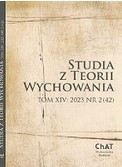To not nurture a war – education against violence (Girard - Patočka)
To not nurture a war – education against violence (Girard - Patočka)
Author(s): Krzysztof MaliszewskiSubject(s): Studies in violence and power, Sociology of Education, Philosophy of Education
Published by: Wydawnictwo Naukowe ChAT
Keywords: violence; education; mimetic rivalry; the solidarity of the shaken; war; achievement society; forces of the day;
Summary/Abstract: The author is primarily interested in violence in the form of joining Girard's persecution crowd. Thus, the text concerns violence not in the general sense as the use of force to break resistance, nor symbolic violence in the sense of Pierre Bourdieu, but in the sense of human disposition to retaliate and persecution - in other words, violence is analyzed here in terms similar to what Erich Fromm called malignant aggression - the tendency to destroy and gain unlimited control over other people and the world. In the text, the author radicalizes the question about the pedagogical context of violence, treating the tendency to hasty curricular and organizational changes (which often occur after events of escalating violence in schools), as well as the utilitarian search for effective preventive evidence-based measures, as illusions and part of the problem we face with violence. He recognizes that pedagogical reflection must go much deeper. He seeks knowledge about the sources of violence and the cultural formations that foster it in the works of the French anthropologist René Girard and the Czech philosopher Jan Patočka. The ideas of mimetic rivalry and the 20th century as war can give us insight into the phenomenon of violence and suggest the direction of educational transformation. The author conducts the analysis in several steps. After a critical introduction to the contemporary reaction of education to violence, he first outlines Girard's concept of the mimetic mechanism, then emphasizes three ideas present in it (with references to the nowadays): violence as an anthropological feature embedded in the human condition, unawareness of one's own violence and unanimity of the persecuting crowd. In the end, these three accents become the basis for the postulate of existential reorientation of education, based on Patočka's concept of forces of the day and the night.
Journal: Studia z Teorii Wychowania
- Issue Year: XIV/2023
- Issue No: 2 (43)
- Page Range: 357-368
- Page Count: 12
- Language: English

